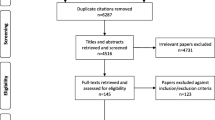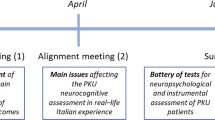Abstract
Neuropsychological research conducted so far on treatment factors in phenylketonuria suggests that dietary cessation at age 6 is too early. However, continuation of diet until age 10 appears to provide protection against subsequent hyperphenylalaninaemia in the domains of perception, memory and motor skill if concentrations remain at least below 1200 μmol/l thereafter. Levels in the range 360 μmol/l to 600 μmol/l appear to constitute a hazard for executive skill during the pre-school period but in the primary school years the risk diminishes. Levels above 900 μmol/l in early adolescence and adulthood may affect executive abilities adversely and the question remains whether such effects are reversible.
Conclusion Though scant, neuropsychological evidence does not seriously contradict current British and German recommendations for dietary control in phenylketonuria.
Similar content being viewed by others
Author information
Authors and Affiliations
Rights and permissions
About this article
Cite this article
Griffiths, P. Neuropsychological approaches to treatment policy issues in phenylketonuria. Eur J Pediatr 159 (Suppl 2), S82–S86 (2000). https://doi.org/10.1007/PL00014390
Issue Date:
DOI: https://doi.org/10.1007/PL00014390




